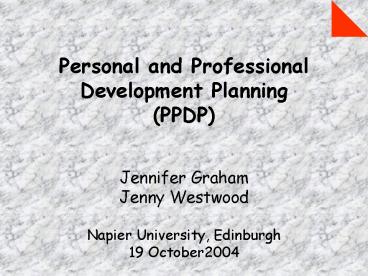Personal and Professional Development Planning PPDP Jennifer Graham Jenny Westwood Napier University
1 / 15
Title: Personal and Professional Development Planning PPDP Jennifer Graham Jenny Westwood Napier University
1
Personal and ProfessionalDevelopment
Planning(PPDP)Jennifer GrahamJenny
WestwoodNapier University, Edinburgh19
October2004
2
PPDP Module(level two)Where am I now? . Where
do I want to be? .How do I get there?
- Underlying philosophy and links to
- employability
- Design, structure, delivery and
- assessment of the module
- The student voice
3
Underlying philosophy of PPDP module
- Help students to
- take responsibility for own learning
- self-evaluate
- develop practice critical reflective skills
- practice action planning for future development
- By
- engaging them in a series of semi-structured
activities - giving them a range of appropriate tools
4
Underlying philosophy of PDP
- Self-awareness
- Development
- Claims making
- CV building
- Peter Knight Enhancement Themes 2004
Conference, Dundee
5
Student Employability Skills and Attributes
Personal qualities self- motivation self-
reliance adaptability/ flexibility personal
values nous/ commonsense creativity
Key skills time management study
skills communication written oral application
of number information/communication
technology working with
others problem-solving
Reflective skills learning to learn identificatio
n of own strengths and development
needs continuously improving one's own performance
Reflective skills
NAPIER UNIVERSITY, EDINBURGH
Understanding of how organisations
work knowledge of working practices professional
behaviour recognition of organisational culture
Traditional intellectual skills critical
evaluation of evidence argue logically apply
theory to practice model problems qualitatively
quantitatively chal
lenge taken-for-granted assumptions
NAPIER UNIVERSITY
6
PPDP Aim and learning outcomes (1)
- Aim
- To introduce and develop the concept of
reflective practice to inform personal and
professional development.
7
PPDP Aim and learning outcomes (2)
- Learning outcomes enable the student to
- identify key components required for reflective
practice - explore strategies for learning and the
implications on personal and professional
development - review a range of employability skills and
attributes and identify their own current status - draw up an appropriate plan with objectives for
future action
8
Modes of delivery
- Focus self-directed study in 2 workbooks
- Taught route
- 1 hour workshop per week
- discussion, role plays, simulation exercises
- Flexible route
- independent work
- three workshops (start, mid, end semester)
- weekly informal email bulletins support, pose
questions and give advice - Plans to use WebCT discussion groups this year
9
Structure of the module
- A. Reflective learning practice - from
academic studies and - outwith the university- work related,
sport, etc - includes
- concept and theory of independent learning
- reflective practices and models
- keeping a reflective learning journal
- B. Developing skills and action planning
- - uses a range of tools eg for problem solving,
- effective communication, teamwork
leadership - includes
- identifying and writing SMART objectives
- action planning for continuous personal and
professional development
10
Assessment
- Personal development portfolio - 40
- 10 prescribed portfolio activities
- - record current strengths and weaknesses
- - over of skills and attributes
- - critical reflection on learning experiences
- Personal professional development plan 60
- 12-15 SMART objectives
- in an action plan that is appropriate and
realistic to their background, personal profile
future aspirations - Additionally both elements require
self-evaluation, - critical reflection on experiences and the
learning - processes
11
Portfolio activity Reflection on learning
experiences
- Introduces students to a range of suitable tools
and techniques to help with reflective activities
- such as
- Kolbs and Bouds reflective cycles
- Critical incident analysis
- Johns model of structured reflection
- The reflective cycle, Atkins and Murphy
- Keeping a learning journal
- Self-evaluation
- The portfolio activities require them to select,
use and analyse appropriate models on a range of
their own different learning experiences
12
Portfolio activity example Working with others
- Choose as an example one of the teams that
you identified earlier and then, by responding to
the issues and questions below for each level
reflect on the extent to which your need has been
met in that group. - Secondly, try and identify an incident, a
remark or an issue that has arisen in the group
which would exemplify how these needs tend to
surface. - The encounter may or may not have involved
you.
13
Student quotes from assessments
- This module has helped me understand the key
areas of both my personal life and professional
life which require development. I am now glad I
chose this module because it has been worthwhile.
I leave this module with a clear action plan on
what I need to do to enhance my skills. - By taking this module in PPDP I have learnt how
important it is to be involved in my own learning
and development. I have learnt that I need to
reflect on what I am doing to be able to
improve.
14
Student quotes from assessments
- I would recommend this module to anyone, it not
only identifies your weak skills it also
identifies weaknesses in your stronger skills. It
has been a very difficult exercise for me because
I am certainly not accustomed to analysing or
reflecting upon myself or my skills need.
15
Student quotes from assessments
- Next year is my final year and I feel more
confident and motivated in my studies since
completing this module and have learnt a lot
about myself and my learning style, through
keeping the journal and I am going to start
keeping one permanently so my reflective learning
process can be enhanced. - I now know the skills that graduate employers
will be looking for and I must have them to get a
good job my action plan will help me to do
this.

